Press releases
“Our government will be consistent in the fight against corruption, and compromises are ruled out here” - Anticorruption Policy Council holds regular meeting
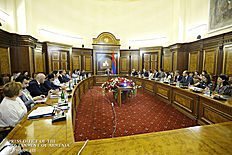 1670x1113px - 816 Kb
1670x1113px - 816 Kb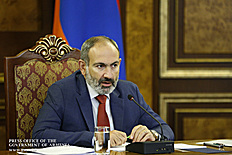 1670x1113px - 635 Kb
1670x1113px - 635 Kb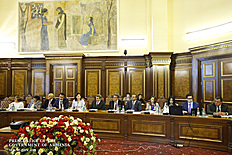 1670x1113px - 778 Kb
1670x1113px - 778 Kb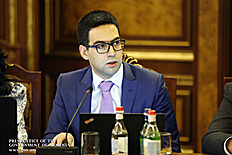 1670x1113px - 583 Kb
1670x1113px - 583 Kb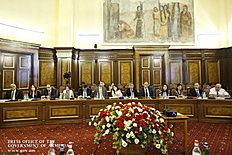 1670x1113px - 822 Kb
1670x1113px - 822 Kb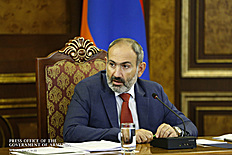 1670x1113px - 610 Kb
1670x1113px - 610 Kb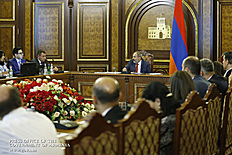 1670x1113px - 704 Kb
1670x1113px - 704 Kb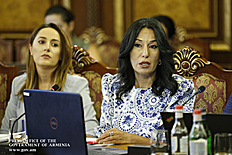 1670x1113px - 692 Kb
1670x1113px - 692 Kb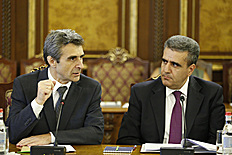 1670x1113px - 633 Kb
1670x1113px - 633 Kb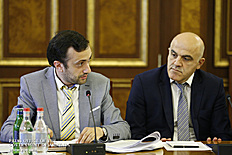 1670x1113px - 649 Kb
1670x1113px - 649 Kb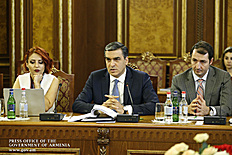 1670x1113px - 728 Kb
1670x1113px - 728 Kb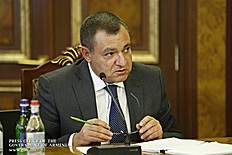 1670x1113px - 629 Kb
1670x1113px - 629 Kb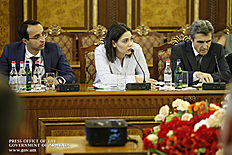 1670x1113px - 729 Kb
1670x1113px - 729 Kb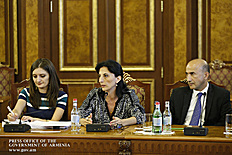 1670x1113px - 711 Kb
1670x1113px - 711 Kb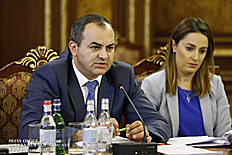 1670x1113px - 710 Kb
1670x1113px - 710 Kb
more 12 photos
Chaired by Prime Minister Nikol Pashinyan, the Anticorruption Policy Council today held a regular meeting in the Office of Government. The meeting was attended by MPs, heads of state agencies, representatives from interested structures, the Prime Minister’s Office and NGOs.
Greeting the meeting participants, Prime Minister Pashinyan said he would like to make a few points before moving on to the agenda. The Premier stated, in part: “It seems to be obvious to everyone that the Armenian government has the political will to curb corruption, and we will be consistent in this matter. When we say that we were able to eradicate systemic corruption in Armenia, this statement is also reflected in the public response, because in this document I saw that according to surveys conducted in May, more than 84% of Armenian citizens said they did not encounter cases of corruption, which is indeed very important.
But I would also like to point out that during the past one year we faced some institutional problems and difficulties consisting in that the fight against corruption, the investigation of corruption crimes, and especially the restoration of damage caused through corrupt schemes fell somewhat short of our expectations.
There are many objective and subjective problems, and the institutional bottlenecks are not the least ones in this blacklist. Part of institutional problems is noticeable at first sight, others are latent, and I think that we should be too consistent in order to reinvigorate the fight against corruption by establishing new institutional structures.
During this time, we have done a lot of effective work to spearhead our anticorruption strategy and formulate the key areas of the fight against corruption. Today’s most important political argument is that our government will be consistent in combating corruption, and compromises are ruled out here.
We have formed a political task: zero tolerance for corruption in the Republic of Armenia, and this is the political goal that we intend to achieve. We are going to discuss the anticorruption strategy and the relevant action plan. It still has to become a Cabinet decision, it should be set into circulation, but I think that we already have a document on the basis of which we can carry out serious and specific work.”
Minister of Justice Rustam Badasyan presented the results of the competition for involvement of non-governmental organizations in the Anticorruption Policy Council and noted that the necessary measures had been taken to ensure the most inclusive participation.
The participation of non-governmental organizations representing the business sector in the Council was also discussed. The Prime Minister highlighted the need for involving non-governmental organizations representing the business sector and accordingly instructed the Minister of Justice.
Within the framework of the agenda, the Minister of Justice presented the anticorruption strategy of the Republic of Armenia and the revised program of measures for its implementation in 2019-2022. According to the Minister, extensive public discussions were held on this document in Yerevan and in the regions, and the finalized version of the strategy includes such important elements as coordination of the implementation of the program of activities, monitoring, control and public communication, as well as a cost estimates and a financial analysis supported by EU experts. A key benchmark of the strategy is the change in the Transparency International Corruption Perception Index, which needs to be upgraded from 35 to 55 points.
Badasyan touched upon the main directions of the Anticorruption Strategy - the development of the institutional system, the prevention of corruption, the detection of corruption crimes, anticorruption education and awareness raising, as well as the implementation of the steps planned in these areas.
In particular, as part of the anticorruption institutional system, it is planned to set up an anticorruption committee, a commission for corruption prevention, specialized anticorruption courts and a department in the General Prosecutor’s Office for investigation of corruption crimes.
The key areas for preventing corruption are as follows: reforming the declaration system, declaring expenses, identifying per-sector risks, developing an action plan, strengthening integrity and introducing e-government tools to simplify administration.
The strategy provides for the definition of a list of corruption offenses in accordance with the Criminal Code, the provision of criminal liability for legal entities, the development of an institution for the confiscation of illegally acquired property, the development and application of a methodology for investigating corruption offenses, the creation of a centralized register of bank accounts.
In the system of education and information, it is planned to introduce anticorruption education in high schools and universities, training personnel, as well as developing and implementing annual public awareness campaigns. The Ministry of Justice shall act as the coordinating authority for this process. A preliminary financial assessment of the total needs is 16,528,044,400 drams.
A wide range of issues were discussed concerning the topics included in the strategy during the exchange of views that followed. In particular, issues of reforming the declaration system, the scope of officials to be declared, the activities of the institutional system and guarantees of independence, the activities of specialized courts, ensuring the capacity of judges, the formation of the necessary material and social guarantees, professional training, reporting by anti-corruption bodies in general, etc. were raised.
Summing up the discussion, Prime Minister Pashinyan emphasized the importance of interested discussions that can help develop a comprehensive version of Armenia’s anticorruption strategy and the action plan for its implementation.
In conclusion, the Prime Minister noted that the discussions had taken note of the opinions and recommendations presented by the stakeholders, part of which were accepted, and the time had come for the document to be approved as soon as possible in order to proceed with its implementation.